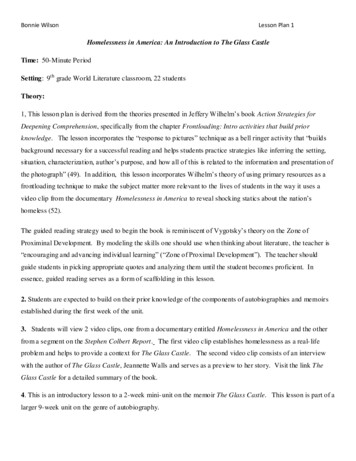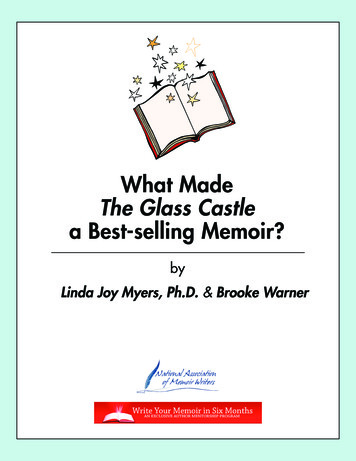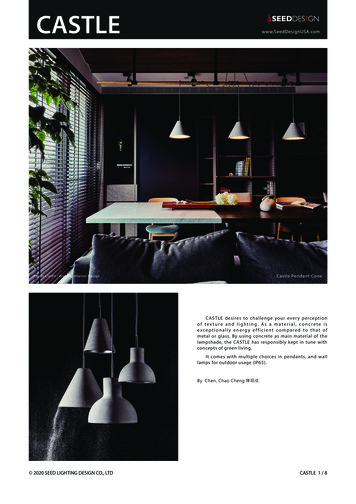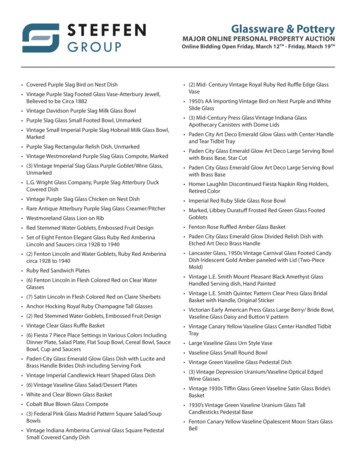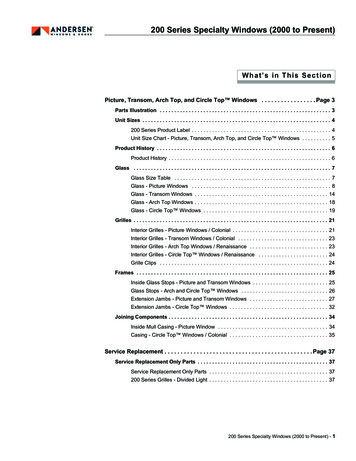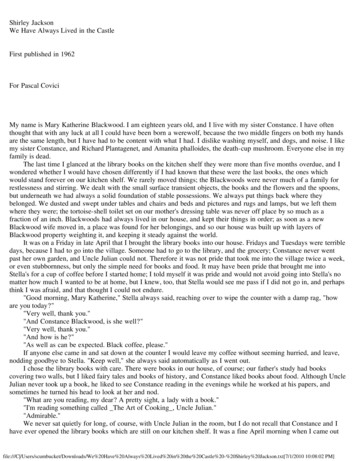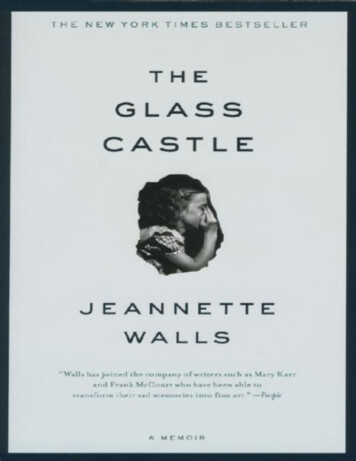
Transcription
The Glass CastleA MemoirJeannette WallsSCRIBNERNew York London Toronto Sydney
Praise for The Glass CastleThe autobiographer is faced with the daunting challenge ofattemptingto understand, forgive and even love the witch. Readers will marvel at theintelligence and resilience of the Walls kids."Francine Prose, The New York Times Book Review"A pull-yourself-up-by-the-bootstraps, thoroughly American story."Kirkus Reviews"Charles Dickens has nothing on Jeannette Walls, author of The GlassCastle, the unflinching story about her grueling, nomadic childhood.Dickens' scenes of poverty and hardship are no more audacious and nomore provocative than those in the pages of this stunning memoir."The Atlanta Journal-Constitution"An excellent book. Walls has a fantastic storytelling knack."Publishers Weekly"The Glass Castle will at times exhaust you, occasionally fill you withfury, and finally leave you in slack-jawed wonderment."National Review Online"Jeannette Walls has decided to tell all, and the result is this rivetingmemoir."Glamour"You'll root for the Walls family."
Newsweek"The Glass Castle is the kind of story that keeps you awake long afterthe rest of the house has fallen asleep."Vogue"Walls writes with clarity and feeling; it's her deep respect that infusesthis astonishing story with grace."Tampa Tribune"A beautiful, brave, transformative book."Rosie O'Donnell"Jeannette Walls has carved a story with precision and grace out of oneof the most chaotic, heartbreaking childhoods ever to be set down on thepage. This deeply affecting memoir is a triumph in every possible way,and it does what all good books should: it affirms our faith in the humanspirit."Dani Shapiro, author of Family History"The Glass Castle is the saga of the restless, indomitable Walls family,led by a grand eccentric and his tempestuous artist wife. Jeannette Wallshas survived poverty, fires, and near starvation to triumph. She has writtenthis amazing tale with honesty and love."Patricia Bosworth, author of Anything Your Little Heart Desires and DianeArbus: A Biography"Just read the first pages of The Glass Castle by Jeannette Walls, and Idefy you not to go on. It's funny and sad and quirky and loving. I wasincredibly touched by it."Dominick Dunne, author of The Way We Lived Then: Recollections of aWell-Known Name Dropper
SCRIBNER1230 Avenue of the AmericasNew York, NY 10020The names and identifying details of some characters in this book havebeen changed.Copyright (c) 2005 by Jeannette WallsAll rights reserved, including the right of reproduction in whole or in partin any form.SCRIBNER and design are trademarks of Macmillan Library ReferenceUSA, Inc., used under license by Simon & Schuster, the publisher of thiswork.Library of Congress Cataloging-in-Publication DataWalls, Jeannette.The glass castle: a memoir / Jeannette Walls.p. cm.1. Walls, Jeannette. 2. Children of alcoholicsUnited StatesBiography.3. Children of alcoholicsWest VirginiaBiography.4. Problem familiesUnited StatesCase studies.5. Problem familiesWest VirginiaWelchCase studies.6. PoorWest VirginiaWelchBiography.7. Homeless personsNew York (State)New YorkFamily relationships.I. Title.HV5132.W35 2005362.82'092dc22[B] 2004058907ISBN: 1-4165-5060-7
Visit us on the World Wide Web:http://www.SimonSays.com
To John,for convincing me that everyone who is interesting has a past
AcknowledgmentsI'd like to thank my brother, Brian, for standing by me when we weregrowing up and while I wrote this. I'm also grateful to my mother forbelieving in art and truth and for supporting the idea of the book; to mybrilliant and talented older sister, Lori, for coming around to it; and to myyounger sister, Maureen, whom I will always love. And to my father, RexS. Walls, for dreaming all those big dreams.Very special thanks also to my agent, Jennifer Rudolph Walsh, for hercompassion, wit, tenacity, and enthusiastic support; to my editor, NanGraham, for her keen sense of how much is enough and for caring sodeeply; and to Alexis Gargagliano for her thoughtful and sensitivereadings.My gratitude for their early and constant support goes to Jay and BetsyTaylor, Laurie Peck, Cynthia and David Young, Amy and Jim Scully,Ashley Pearson, Dan Mathews, Susan Watson, and Jessica Taylor and AlexGuerrios.I can never adequately thank my husband, John Taylor, who persuadedme it was time to tell my story and then pulled it out of me.
Dark is a way and light is a place,Heaven that never wasNor will be ever is always trueDylan Thomas,"Poem on His Birthday"
IA WOMAN ON THE STREETI WAS SITTING IN a taxi, wondering if I had overdressed for theevening, when I looked out the window and saw Mom rooting through aDumpster. It was just after dark. A blustery March wind whipped thesteam coming out of the manholes, and people hurried along the sidewalkswith their collars turned up. I was stuck in traffic two blocks from theparty where I was heading.Mom stood fifteen feet away. She had tied rags around her shoulders tokeep out the spring chill and was picking through the trash while her dog,a black-and-white terrier mix, played at her feet. Mom's gestures were allfamiliarthe way she tilted her head and thrust out her lower lip whenstudying items of potential value that she'd hoisted out of the Dumpster,the way her eyes widened with childish glee when she found somethingshe liked. Her long hair was streaked with gray, tangled and matted, andher eyes had sunk deep into their sockets, but still she reminded me of themom she'd been when I was a kid, swan-diving off cliffs and painting inthe desert and reading Shakespeare aloud. Her cheekbones were still highand strong, but the skin was parched and ruddy from all those winters andsummers exposed to the elements. To the people walking by, she probablylooked like any of the thousands of homeless people in New York City.It had been months since I laid eyes on Mom, and when she looked up,I was overcome with panic that she'd see me and call out my name, andthat someone on the way to the same party would spot us together andMom would introduce herself and my secret would be out.I slid down in the seat and asked the driver to turn around and take mehome to Park Avenue.The taxi pulled up in front of my building, the doorman held the doorfor me, and the elevator man took me up to my floor. My husband wasworking late, as he did most nights, and the apartment was silent exceptfor the click of my heels on the polished wood floor. I was still rattledfrom seeing Mom, the unexpectedness of coming across her, the sight of
her rooting happily through the Dumpster. I put some Vivaldi on, hopingthe music would settle me down.I looked around the room. There were the turn-of-the-century bronzeand-silver vases and the old books with worn leather spines that I'dcollected at flea markets. There were the Georgian maps I'd had framed,the Persian rugs, and the overstuffed leather armchair I liked to sink intoat the end of the day. I'd tried to make a home for myself here, tried to turnthe apartment into the sort of place where the person I wanted to be wouldlive. But I could never enjoy the room without worrying about Mom andDad huddled on a sidewalk grate somewhere. I fretted about them, but Iwas embarrassed by them, too, and ashamed of myself for wearing pearlsand living on Park Avenue while my parents were busy keeping warm andfinding something to eat.What could I do? I'd tried to help them countless times, but Dad wouldinsist they didn't need anything, and Mom would ask for something silly,like a perfume atomizer or a membership in a health club. They said thatthey were living the way they wanted to.After ducking down in the taxi so Mom wouldn't see me, I hatedmyselfhated my antiques, my clothes, and my apartment. I had to dosomething, so I called a friend of Mom's and left a message. It was oursystem of staying in touch. It always took Mom a few days to get back tome, but when I heard from her, she sounded, as always, cheerful andcasual, as though we'd had lunch the day before. I told her I wanted to seeher and suggested she drop by the apartment, but she wanted to go to arestaurant. She loved eating out, so we agreed to meet for lunch at herfavorite Chinese restaurant.Mom was sitting at a booth, studying the menu, when I arrived. She'dmade an effort to fix herself up. She wore a bulky gray sweater with only afew light stains, and black leather men's shoes. She'd washed her face, buther neck and temples were still dark with grime.She waved enthusiastically when she saw me. "It's my baby girl!" shecalled out. I kissed her cheek. Mom had dumped all the plastic packets ofsoy sauce and duck sauce and hot-and-spicy mustard from the table intoher purse. Now she emptied a wooden bowl of dried noodles into it aswell. "A little snack for later on," she explained.We ordered. Mom chose the Seafood Delight. "You know how I lovemy seafood," she said.
She started talking about Picasso. She'd seen a retrospective of hiswork and decided he was hugely overrated. All the cubist stuff wasgimmicky, as far as she was concerned. He hadn't really done anythingworthwhile after his Rose Period."I'm worried about you," I said. "Tell me what I can do to help."Her smile faded. "What makes you think I need your help?""I'm not rich," I said. "But I have some money. Tell me what it is youneed."She thought for a moment. "I could use an electrolysis treatment.""Be serious.""I am serious. If a woman looks good, she feels good.""Come on, Mom." I felt my shoulders tightening up, the way theyinvariably did during these conversations. "I'm talking about somethingthat could help you change your life, make it better.""You want to help me change my life?" Mom asked. "I'm fine. You'rethe one who needs help. Your values are all confused.""Mom, I saw you picking through trash in the East Village a few daysago.""Well, people in this country are too wasteful. It's my way ofrecycling." She took a bite of her Seafood Delight. "Why didn't you sayhello?""I was too ashamed, Mom. I hid."Mom pointed her chopsticks at me. "You see?" she said. "Right there.That's exactly what I'm saying. You're way too easily embarrassed. Yourfather and I are who we are. Accept it.""And what am I supposed to tell people about my parents?""Just tell the truth," Mom said. "That's simple enough."
IITHE DESERTI WAS ON FIRE.It's my earliest memory. I was three years old, and we were living in atrailer park in a southern Arizona town whose name I never knew. I wasstanding on a chair in front of the stove, wearing a pink dress mygrandmother had bought for me. Pink was my favorite color. The dress'sskirt stuck out like a tutu, and I liked to spin around in front of the mirror,thinking I looked like a ballerina. But at that moment, I was wearing thedress to cook hot dogs, watching them swell and bob in the boiling wateras the late-morning sunlight filtered in through the trailer's smallkitchenette window.I could hear Mom in the next room singing while she worked on one ofher paintings. Juju, our black mutt, was watching me. I stabbed one of thehot dogs with a fork and bent over and offered it to him. The wiener washot, so Juju licked at it tentatively, but when I stood up and started stirringthe hot dogs again, I felt a blaze of heat on my right side. I turned to seewhere it was coming from and realized my dress was on fire. Frozen withfear, I watched the yellow-white flames make a ragged brown line up thepink fabric of my skirt and climb my stomach. Then the flames leaped up,reaching my face.I screamed. I smelled the burning and heard a horrible crackling as thefire singed my hair and eyelashes. Juju was barking. I screamed again.Mom ran into the room."Mommy, help me!" I shrieked. I was still standing on the chair,swatting at the fire with the fork I had been using to stir the hot dogs.Mom ran out of the room and came back with one of the army-surplusblankets I hated because the wool was so scratchy. She threw the blanketaround me to smother the flames. Dad had gone off in the car, so Momgrabbed me and my younger brother, Brian, and hurried over to the trailernext to ours. The woman who lived there was hanging her laundry on theclothesline. She had clothespins in her mouth. Mom, in an unnaturallycalm voice, explained what had happened and asked if we could please
have a ride to the hospital. The woman dropped her clothespins andlaundry right there in the dirt and, without saying anything, ran for her car.***When we got to the hospital, nurses put me on a stretcher. They talkedin loud, worried whispers while they cut off what was left of my fancypink dress with a pair of shiny scissors. Then they picked me up, laid meflat on a big metal bed piled with ice cubes, and spread some of the iceover my body. A doctor with silver hair and black-rimmed glasses led mymother out of the room. As they left, I heard him telling her that it wasvery serious. The nurses remained behind, hovering over me. I could tell Iwas causing a big fuss, and I stayed quiet. One of them squeezed my handand told me I was going to be okay."I know," I said, "but if I'm not, that's okay, too."The nurse squeezed my hand again and bit her lower lip.The room was small and white, with bright lights and metal cabinets. Istared for a while at the rows of tiny dots in the ceiling panels. Ice cubescovered my stomach and ribs and pressed up against my cheeks. Out of thecorner of my eye, I saw a small, grimy hand reach up a few inches frommy face and grab a handful of cubes. I heard a loud crunching sound andlooked down. It was Brian, eating the ice.***The doctors said I was lucky to be alive. They took patches of skinfrom my upper thigh and put them over the most badly burned parts of mystomach, ribs, and chest. They said it was called a skin graft. When theywere finished, they wrapped my entire right side in bandages."Look, I'm a half-mummy," I said to one of the nurses. She smiled andput my right arm in a sling and attached it to the headboard so I couldn'tmove it.The nurses and doctors kept asking me questions: How did you getburned? Have your parents ever hurt you? Why do you have all thesebruises and cuts? My parents never hurt me, I said. I got the cuts andbruises playing outside and the burns from cooking hot dogs. They askedwhat I was doing cooking hot dogs by myself at the age of three. It was
easy, I said. You just put the hot dogs in the water and boil them. It wasn'tlike there was some complicated recipe that you had to be old enough tofollow. The pan was too heavy for me to lift when it was full of water, soI'd put a chair next to the sink, climb up and fill a glass, then stand on achair by the stove and pour the water into the pan. I did that over and overagain until the pan held enough water. Then I'd turn on the stove, and whenthe water was boiling, I'd drop in the hot dogs. "Mom says I'm mature formy age," I told them. "and she lets me cook for myself a lot."Two nurses looked at each other, and one of them wrote somethingdown on a clipboard. I asked what was wrong. Nothing, they said, nothing.***Every couple of days, the nurses changed the bandages. They wouldput the used bandage off to the side, wadded and covered with smears ofblood and yellow stuff and little pieces of burned skin. Then they'd applyanother bandage, a big gauzy cloth, to the burns. At night I would run myleft hand over the rough, scabby surface of the skin that wasn't covered bythe bandage. Sometimes I'd peel off scabs. The nurses had told me not to,but I couldn't resist pulling on them real slow to see how big a scab I couldget loose. Once I had a couple of them free, I'd pretend they were talkingto each other in cheeping voices.The hospital was clean and shiny. Everything was whitethe walls andsheets and nurses' uniformsor silverthe beds and trays and medicalinstruments. Everyone spoke in polite, calm voices. It was so hushed youcould hear the nurses' rubber-soled shoes squeaking all the way down thehall. I wasn't used to quiet and order, and I liked it.I also liked it that I had my own room, since in the trailer I shared onewith my brother and my sister. My hospital room even had its very owntelevision set up on the wall. We didn't have a TV at home, so I watched ita lot. Red Buttons and Lucille Ball were my favorites.The nurses and doctors always asked how I was feeling and if I washungry or needed anything. The nurses brought me delicious meals threetimes a day, with fruit cocktail or Jell-O for dessert, and changed thesheets even if they still looked clean. Sometimes I read to them, and theytold me I was very smart and could read as well as a six-year-old.
One day a nurse with wavy yellow hair and blue eye makeup waschewing on something. I asked her what it was, and she told me it waschewing gum. I had never heard of chewing gum, so she went out and gotme a whole pack. I pulled out a stick, took off the white paper and theshiny silver foil under it, and studied the powdery, putty-colored gum. Iput it in my mouth and was stunned by the sharp sweetness. "It's reallygood!" I said."Chew on it, but don't swallow it," the nurse said with a laugh. Shesmiled real big and brought in other nurses so they could watch me chewmy first-ever piece of gum. When she brought me lunch, she told me I hadto take out my chewing gum, but she said not to worry because I couldhave a new stick after eating. If I finished the pack, she would buy meanother. That was the thing about the hospital. You never had to worryabout running out of stuff like food or ice or even chewing gum. I wouldhave been happy staying in that hospital forever.***When my family came to visit, their arguing and laughing and singingand shouting echoed through the quiet halls. The nurses made shushingnoises, and Mom and Dad and Lori and Brian lowered their voices for afew minutes, then they slowly grew loud again. Everyone always turnedand stared at Dad. I couldn't figure out whether it was because he was sohandsome or because he called people. "pardner" and. "goomba" and threwhis head back when he laughed.One day Dad leaned over my bed and asked if the nurses and doctorswere treating me okay. If they were not, he said, he would kick some asses.I told Dad how nice and friendly everyone was. "Well, of course they are,"he said. "They know you're Rex Walls's daughter."When Mom wanted to know what it was the doctors and nurses weredoing that was so nice, I told her about the chewing gum."Ugh," she said. She disapproved of chewing gum, she went on. It wasa disgusting low-class habit, and the nurse should have consulted herbefore encouraging me in such vulgar behavior. She said she was going togive that woman a piece of her mind, by golly. "After all," Mom said. "Iam your mother, and I should have a say in how you're raised."
***"Do you guys miss me?" I asked my older sister, Lori, during one visit."Not really," she said. "Too much has been happening.""Like what?""Just the normal stuff.""Lori may not miss you, honey bunch, but I sure do," Dad said. "Youshouldn't be in this antiseptic joint."He sat down on my bed and started telling me the story about the timeLori got stung by a poisonous scorpion. I'd heard it a dozen times, but Istill liked the way Dad told it. Mom and Dad were out exploring in thedesert when Lori, who was four, turned over a rock and the scorpion hidingunder it stung her leg. She had gone into convulsions, and her body hadbecome stiff and wet with sweat. But Dad didn't trust hospitals, so he tookher to a Navajo witch doctor who cut open the wound and put a dark brownpaste on it and said some chants and pretty soon Lori was as good as new."Your mother should have taken you to that witch doctor the day you gotburned," Dad said, "not to these heads-up-their-asses med-school quacks."***The next time they visited, Brian's head was wrapped in a dirty whitebandage with dried bloodstains. Mom said he had fallen off the back of thecouch and cracked his head open on the floor, but she and Dad had decidednot to take him to the hospital."There was blood everywhere," Mom said. "but one kid in the hospitalat a time is enough.""Besides," Dad said, "Brian's head is so hard, I think the floor tookmore damage than he did."Brian thought that was hilarious and just laughed and laughed.Mom told me she had entered my name in a raffle at a fair, and I'd wona helicopter ride. I was thrilled. I had never been in a helicopter or a plane."When do I get to go on the ride?" I asked."Oh, we already did that," Mom said. "It was fun."Then Dad got into an argument with the doctor. It started because Dadthought I shouldn't be wearing bandages. "Burns need to breathe," he toldthe doctor.
The doctor said bandages were necessary to prevent infection. Dadstared at the doctor. "To hell with infection," he said. He told the doctorthat I was going to be scarred for life because of him, but, by God, I wasn'tthe only one who was going to walk out of there scarred.Dad pulled back his fist as if to hit the doctor, who raised his handsand backed away. Before anything could happen, a guard in a uniformappeared and told Mom and Dad and Lori and Brian that they would haveto leave.Afterward, a nurse asked me if I was okay. "Of course," I said. I toldher I didn't care if I had some silly old scar. That was good, she said,because from the look of it, I had other things to worry about.***A few days later, when I had been at the hospital for about six weeks,Dad appeared alone in the doorway of my room. He told me we were goingto check out, Rex Wallsstyle."Are you sure this is okay?" I asked."You just trust your old man," Dad said.He unhooked my right arm from the sling over my head. As he held meclose, I breathed in his familiar smell of Vitalis, whiskey, and cigarettesmoke. It reminded me of home.Dad hurried down the hall with me in his arms. A nurse yelled for us tostop, but Dad broke into a run. He pushed open an emergency-exit doorand sprinted down the stairs and out to the street. Our car, a beat-upPlymouth we called the Blue Goose, was parked around the corner, theengine idling. Mom was up front, Lori and Brian in the back with Juju.Dad slid me across the seat next to Mom and took the wheel."You don't have to worry anymore, baby," Dad said. "You're safe now."A FEW DAYS AFTER Mom and Dad brought me home, I cookedmyself some hot dogs. I was hungry, Mom was at work on a painting, andno one else was there to fix them for me."Good for you," Mom said when she saw me cooking. "You've got toget right back in the saddle. You can't live in fear of something as basic asfire."
I didn't. Instead, I became fascinated with it. Dad also thought I shouldface down my enemy, and he showed me how to pass my finger through acandle flame. I did it over and over, slowing my finger with each pass,watching the way it seemed to cut the flame in half, testing to see howmuch my finger could endure without actually getting burned. I wasalways on the lookout for bigger fires. Whenever neighbors burned trash, Iran over and watched the blaze trying to escape the garbage can. I'd inchcloser and closer, feeling the heat against my face until I got so near that itbecame unbearable, and then I'd back away just enough to be able to standit.The neighbor lady who had driven me to the hospital was surprisedthat I didn't run in the opposite direction from any fire I saw. "Why thehell would she?" Dad bellowed with a proud grin. "She already fought thefire once and won."I started stealing matches from Dad. I'd go behind the trailer and lightthem. I loved the scratching sound of the match against the sandpaperybrown strip when I struck it, and the way the flame leaped out of theredcoated tip with a pop and a hiss. I'd feel its heat near my fingertips,then wave it out triumphantly. I lit pieces of paper and little piles of brushand held my breath until the moment when they seemed about to blaze upout of control. Then I'd stomp on the flames and call out the curse wordsDad used, like. "Dumb-ass sonofabitch!" and. "Cocksucker!"One time I went out back with my favorite toy, a plastic Tinkerbellfigurine. She was two inches tall, with yellow hair pulled up in a highponytail and her hands on her hips in a confident, cocky way that Iadmired. I lit a match and held it close to Tinkerbell's face to show herhow it felt. She looked even more beautiful in the flame's glow. When thatmatch went out, I lit another one, and this time I held it really close toTinkerbell's face. Suddenly, her eyes grew wide, as if with fear; I realized,to my horror, that her face was starting to melt. I put out the match, but itwas too late. Tinkerbell's once perfect little nose had completelydisappeared, and her saucy red lips had been replaced with an ugly,lopsided smear. I tried to smooth her features back to the way they hadbeen, but I made them even worse. Almost immediately, her face cooledand hardened again. I put bandages on it. I wished I could perform a skingraft on Tinkerbell, but that would have meant cutting her into pieces.Even though her face was melted, she was still my favorite toy.
DAD CAME HOME IN the middle of the night a few months laterand roused all of us from bed."Time to pull up stakes and leave this shit-hole behind," he hollered.We had fifteen minutes to gather whatever we needed and pile into thecar."Is everything okay, Dad?" I asked. "Is someone after us?""Don't you worry," Dad said. "You leave that to me. Don't I always takecare of you?""'Course you do," I said."That's my girl!" Dad said with a hug, then barked orders at us all tospeed things up. He took the essentialsa big black cast-iron skillet and theDutch oven, some army-surplus tin plates, a few knives, his pistol, andMom's archery setand packed them in the trunk of the Blue Goose. He saidwe shouldn't take much else, just what we needed to survive. Mom hurriedout to the yard and started digging holes by the light of the moon, lookingfor our jar of cash. She had forgotten where she'd buried it.An hour passed before we finally tied Mom's paintings on the top ofthe car, shoved whatever would fit into the trunk, and piled the overflowon the backseat and the car floor. Dad steered the Blue Goose through thedark, driving slowly so as not to alert anyone in the trailer park that wewere, as Dad liked to put it, doing the skedaddle. He was grumbling that hecouldn't understand why the hell it took so long to grab what we neededand haul our asses into the car."Dad!" I said. "I forgot Tinkerbell!""Tinkerbell can make it on her own," Dad said. "She's like my bravelittle girl. You are brave and ready for adventure, right?""I guess," I said. I hoped whoever found Tinkerbell would love herdespite her melted face. For comfort, I tried to cradle Quixote, our grayand white cat who was missing an ear, but he growled and scratched at myface. "Quiet, Quixote!" I said."Cats don't like to travel," Mom explained.Anyone who didn't like to travel wasn't invited on our adventure, Dadsaid. He stopped the car, grabbed Quixote by the scruff of the neck, andtossed him out the window. Quixote landed with a screeching meow and athud, Dad accelerated up the road, and I burst into tears."Don't be so sentimental," Mom said. She told me we could always getanother cat, and now Quixote was going to be a wild cat, which was much
more fun than being a house cat. Brian, afraid that Dad might toss Juju outthe window as well, held the dog tight.To distract us kids, Mom got us singing songs like. "Don't Fence MeIn" and. "This Land Is Your Land," and Dad led us in rousing renditions of."Old Man River" and his favorite. "Swing Low, Sweet Chariot." After awhile, I forgot about Quixote and Tinkerbell and the friends I'd left behindin the trailer park. Dad started telling us about all the exciting things wewere going to do and how we were going to get rich once we reached thenew place where we were going to live."Where are we going, Dad?" I asked."Wherever we end up," he said.***Later that night, Dad stopped the car out in the middle of the desert,and we slept under the stars. We had no pillows, but Dad said that was partof his plan. He was teaching us to have good posture. The Indians didn'tuse pillows, either, he explained, and look how straight they stood. We didhave our scratchy army-surplus blankets, so we spread them out and laythere, looking up at the field of stars. I told Lori how lucky we were to besleeping out under the sky like Indians."We could live like this forever," I said."I think we're going to," she said.WE WERE ALWAYS DOING the skedaddle, usually in the middle ofthe night. I sometimes heard Mom and Dad discussing the people whowere after us. Dad called them henchmen, bloodsuckers, and the gestapo.Sometimes he would make mysterious references to executives fromStandard Oil who were trying to steal the Texas land that Mom's familyowned, and FBI agents who were after Dad for some dark episode that henever told us about because he didn't want to put us in danger, too.Dad was so sure a posse of federal investigators was on our trail thathe smoked his unfiltered cigarettes from the wrong end. That way, heexplained, he burned up the brand name, and if the people who weretracking us looked in his ashtray, they'd find unidentifiable butts instead ofPall Malls that could be traced to him. Mom, however, told us that the FBI
wasn't really after Dad; he just liked to say they were because it was morefun having the FBI on your tail than bill collectors.We moved around like nomads. We lived in dusty little mining townsin Nevada, Arizona, and California. They were usually nothing but a tinycluster of sad, sunken shacks, a gas station, a dry-goods store, and a bar ortwo. They had names like Needles and Bouse, Pie, Goffs, and Why, andthey were near places like the Superstition Mountains, the dried-up SodaLake, and the Old Woman Mountain. The more desolate and isolated aplace was, the bette
"The Glass Castle is the saga of the restless, indomitable Walls family, led by a grand eccentric and his tempestuous artist wife. Jeannette Walls has survived poverty, fires, and near starvation to triumph. She has written this amazing tale with honesty and love." Patricia Bosworth, author of Anything Your Little Heart Desires and Diane


